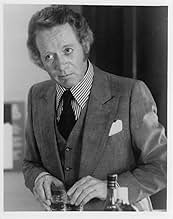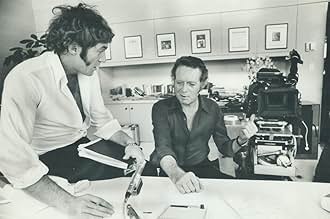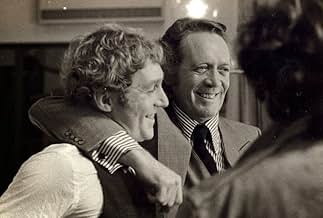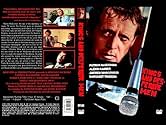A group of terrorists take a radio disk jockey and his wife and child hostage in order to get their manifesto out to the world.A group of terrorists take a radio disk jockey and his wife and child hostage in order to get their manifesto out to the world.A group of terrorists take a radio disk jockey and his wife and child hostage in order to get their manifesto out to the world.
- Awards
- 1 nomination total
Peter MacNeill
- George
- (as Peter McNeil)
Featured reviews
Overly long and often aimless hostage story with lots of funky camera angles that try to convey confusion -- though one need not look much farther than the plot for that. Good performances by McGoohan & Kanner (who worked together on McGoohan's THE PRISONER), but overall, the poor plot drags it down.
John Kingsley is a former stage actor who hosts a Canadian based radio phone in on various topics in a provocative and sniping style. As Christmas approaches he is tricked into opening up his studio to an armed radical historian and his partner, whose colleagues are holding Kingsley's wife and son as well as a city's mayor, in order to bring attention to an unjustly sentenced hit and run driver.
The aims seem lofty, co-writer, director and star Alexis Kanner attempts commentary on political ambition and naivety, misdirected violence, class and celebrity. However, he hands in a pretentiously edited and shot, self consciously arty and clunky dialogue driven drama with what appears to be an appropriately inebriated performance from Patrick McGoohan as the suave, sozzled, and compromised radio host. Kanner's own dazed turn as the would-be intellectual champion of justice fails to launch, but his finished product has spirit and a daring that could either be admired or jeered at (as many critics did). As seen from previous reviews connoisseurs of McGoohan and Kanner's interactions in The Prisoner will scan this movie for other significances.
The aims seem lofty, co-writer, director and star Alexis Kanner attempts commentary on political ambition and naivety, misdirected violence, class and celebrity. However, he hands in a pretentiously edited and shot, self consciously arty and clunky dialogue driven drama with what appears to be an appropriately inebriated performance from Patrick McGoohan as the suave, sozzled, and compromised radio host. Kanner's own dazed turn as the would-be intellectual champion of justice fails to launch, but his finished product has spirit and a daring that could either be admired or jeered at (as many critics did). As seen from previous reviews connoisseurs of McGoohan and Kanner's interactions in The Prisoner will scan this movie for other significances.
Prisoner-fans take note, if you haven't already. This film reunites Prisoner star Patrick McGoohan with frequent Prisoner player Alexis Kanner. This undoubtedly started as one of those "concept movie projects". Get a load of this story: Charismatic, histrionic ex-actor turned Montreal radio talk-show host John Kingsley (Patrick McGoohan) is held hostage in his own private luxury radio-studio by a group of crusaders who want an on-the-air retrial of a man they feel was wrongly convicted and oversentenced at that, kidnapping the original judge who tried the first trial and detaining him elsewhere, then designating the listening audience as the phone-in jury. When I first read this description on the back of the video cover at a Pittsburgh flea-market circa 2001, I put down my two dollars because I was instantly hooked and intrigued. McGoohan's involvement certainly didn't hurt the prospect of my purchase...and, hey hey hey, it was obscure! Just my cup of tea! Ha ha! So, I popped the tape into the VCR and the movie underwent the customary Hidden-Gem Test (the GHTs...funner than the SATs and GREs, and more efficient!). It passed in flying colors, but not in the way I would have ever predicted. Its execution was almost...otherworldly. The camera placement is sometimes highly unorthodox, the sound design highly experimental, the acting decidedly stylized, the editing complexly fragmentary and elliptical, the politics offbeat even in the left-wing sense of the word, the narrative progression delightfully perplexing. What an interesting, strange creature this film was to me...and still is! This is one of those movies that, as a cinephile, I became obsessed with for years after first seeing, and it was a mighty quest to learn as much as I could about it inception, conception and reception. It plays out like an experimental film in some stretches, and renders its hook/reel-in of a plot summary a curiously distinctive thriller with a nearly inimitable sense of voice. By voice, I mean camera voice, montage voice, narrative voice and even soundscape voice. That's a lot of voices there, and a lot of films do not even have one type of those uniquenesses. This is a motion picture that is difficult to describe to the fullest using just words. Kings and Desperate Men is definitively a thriller, without question. It uses the conventions and the narrative traditions of genre (e.g. the unstable captor, periodic showdowns between captor and captive, etc) but uses a flamboyant, barbed cinema language and a twisting dialogic verbiage, courtesy mostly of McGoohan's purposefully melodramatic portrayal of the lead, and elaborate use of the film-making's "plastic" elements to deliver to its audience something completely in opposition to other offerings of its genre.
The film had a scattered release. It was shot in the winter of late 1977, was screened once in Montreal in late 1978, was widely released in its native Canada three years later in 1981 after its struggle to find additional completion funds, was later re-released only in Canada in 1983, premiered at the London Film Festival in 1985 and then finally hit the United States over a full decade later in 1989. That is quite a history. The film was met with accolades at the London Film Festival, but only The Los Angeles Times gave the film good reviews in the U.S. In point of fact, The Los Angeles Times gave it glowing reviews. Most critics obtusely complained of McGoohan's overacting, and every major U.S. review I read was facile, fast and artless. It definitely says something when a critic's dismissals are coy and mirthless. Vis a vis McGoohan's so-called "overacting," that's the point, folks! It's not hard to get! The story itself unfolds by sheer virtue of his character's history as an ex-actor and the writer-director's statement is made via McGoohan's character's titanic "emceeing" of the events at hand. Look at the art direction. Theater posters from the character's past are prominently on display. The film, when all is said and done, has a bold and (believe it or not) original message about media treatment of exploitable circumstance. I mean, the subject has been done before, but never like this. Again, all more I can really say is do your best to see it. It is only on VHS, but if you still have your VCR (if you are a real film fan and ditched yours, you are doing yourself no favors), I recommend tracking it down. In a post scriptum, I gave my copy to a friend to borrow. He definitely joined the film's micro-cult after seeing it. Rise to the occasion and join us!
The film had a scattered release. It was shot in the winter of late 1977, was screened once in Montreal in late 1978, was widely released in its native Canada three years later in 1981 after its struggle to find additional completion funds, was later re-released only in Canada in 1983, premiered at the London Film Festival in 1985 and then finally hit the United States over a full decade later in 1989. That is quite a history. The film was met with accolades at the London Film Festival, but only The Los Angeles Times gave the film good reviews in the U.S. In point of fact, The Los Angeles Times gave it glowing reviews. Most critics obtusely complained of McGoohan's overacting, and every major U.S. review I read was facile, fast and artless. It definitely says something when a critic's dismissals are coy and mirthless. Vis a vis McGoohan's so-called "overacting," that's the point, folks! It's not hard to get! The story itself unfolds by sheer virtue of his character's history as an ex-actor and the writer-director's statement is made via McGoohan's character's titanic "emceeing" of the events at hand. Look at the art direction. Theater posters from the character's past are prominently on display. The film, when all is said and done, has a bold and (believe it or not) original message about media treatment of exploitable circumstance. I mean, the subject has been done before, but never like this. Again, all more I can really say is do your best to see it. It is only on VHS, but if you still have your VCR (if you are a real film fan and ditched yours, you are doing yourself no favors), I recommend tracking it down. In a post scriptum, I gave my copy to a friend to borrow. He definitely joined the film's micro-cult after seeing it. Rise to the occasion and join us!
Slow boil. That's how I would describe this Canadian drama/thriller.This is not an action movie as much as it is a battle of wits sort of like Sleuth. I could easily imagine this story being performed on stage with the setting being John Kingsley's studio.
Like any fan of the classic surrealistic torrent of a TV show, The Prisoner. Patrick McGoohan's show ran for 17 episodes. It ended in a sea of controversy because it refused to follow the conventions of storytelling. Alexis Kanner appeared in three different episodes of that show. His characters were wild, unpredictable and boyishly devious. McGoohan thought enough about Kanner to have him return for the series finale which was filmed a year after it's predecessor leading up to it. McGoohan directed Kanner and now in Kings and Desperate Men, Kanner is directing McGoohan.
The film uses audio a lot in the beginning and frankly, it's a little frantic and disorientating not knowing who is speaking. If you listen carefully later, you are able to put faces to the voices. This is an enigmatic beginning to any film.
The story revolves around a British radio talk show host, living in Canada, who himself/his wife, his son and his radio show are all held hostage. Also being held hostage is a judge who sentenced a man to jail for 15 years. His crime was vehicular manslaughter. The, let's call them domestic terrorists, either acting out of friendship fr the convicted man, or revenge on his behalf, or out of some political motive seize the people and the show to hold a 'public trial' of the man who was sentenced to 15 years.
Now, like any movie or theater project led by an actor, the story is fueled heavily by the characters. Much of the story is a battle of wits between the ringleader of the terrorists, Lucas Miller played by Alexis Kanner (in one of his last appearances in front of the camera) and the radio host Kinglsey played by McGoohan.
The movie also features the then wife of the then PM of Canada, Margaret Trudeau. Andrea Marcovicci who, I frankly know her best from The Stuff is memorable as one of the six terrorists. Her character is somewhat of a loose cannon much like Frank Moore's portrayal. He played one of the terrorists also.
If you have an appreciation for these actors already (especially Prisoner fans) you will find this movie to be a treat. If you enjoy a somewhat out of left field psychological thriller then you will find this to be a treat also. There's enough eccentricities and black humor to make the near 2 hours pleasurable and rewarding.
Like any fan of the classic surrealistic torrent of a TV show, The Prisoner. Patrick McGoohan's show ran for 17 episodes. It ended in a sea of controversy because it refused to follow the conventions of storytelling. Alexis Kanner appeared in three different episodes of that show. His characters were wild, unpredictable and boyishly devious. McGoohan thought enough about Kanner to have him return for the series finale which was filmed a year after it's predecessor leading up to it. McGoohan directed Kanner and now in Kings and Desperate Men, Kanner is directing McGoohan.
The film uses audio a lot in the beginning and frankly, it's a little frantic and disorientating not knowing who is speaking. If you listen carefully later, you are able to put faces to the voices. This is an enigmatic beginning to any film.
The story revolves around a British radio talk show host, living in Canada, who himself/his wife, his son and his radio show are all held hostage. Also being held hostage is a judge who sentenced a man to jail for 15 years. His crime was vehicular manslaughter. The, let's call them domestic terrorists, either acting out of friendship fr the convicted man, or revenge on his behalf, or out of some political motive seize the people and the show to hold a 'public trial' of the man who was sentenced to 15 years.
Now, like any movie or theater project led by an actor, the story is fueled heavily by the characters. Much of the story is a battle of wits between the ringleader of the terrorists, Lucas Miller played by Alexis Kanner (in one of his last appearances in front of the camera) and the radio host Kinglsey played by McGoohan.
The movie also features the then wife of the then PM of Canada, Margaret Trudeau. Andrea Marcovicci who, I frankly know her best from The Stuff is memorable as one of the six terrorists. Her character is somewhat of a loose cannon much like Frank Moore's portrayal. He played one of the terrorists also.
If you have an appreciation for these actors already (especially Prisoner fans) you will find this movie to be a treat. If you enjoy a somewhat out of left field psychological thriller then you will find this to be a treat also. There's enough eccentricities and black humor to make the near 2 hours pleasurable and rewarding.
Despite the presence of the usually fascinating Patrick McGoohan, "Kings and Desperate Men" is almost a total failure. From a plot standpoint, the elaborate hostage taking scheme over a comrade's 15 year sentence for vehicular homicide seems unlikely at best and totally unbelievable at worst. The relationship of the hostage takers to the imprisoned criminal is never explained, and a who cares attitude permeates the film. From a technical standpoint, things are even worse. Long segments of dialog are incomprehensible, and the camera-work could only be described as annoying. What you get is a boring movie that will be a form of punishment for almost everyone. - MERK
Did you know
- TriviaThis film was the brainchild of Alexis Kanner. He and Patrick McGoohan met via Kanner's performance in an episode of McGoohan's popular British television show Le prisonnier (1967). Kanner worked on the idea and polished it for a few years before finally calling up McGoohan to ask him to star in the film.
- GoofsThe reflection of two crew members are briefly seen just before Margaret Trudeau enters an elevator towards the beginning of the film.
- Quotes
Lucas Miller: When you sign off at the end of your show, you always say, "This is your program"... well I am taking you up on that, Mr. Kingsley.
- Crazy creditsKineversal Productions Presents a Film of a Hostage Incident
- ConnectionsFeatured in In Search of the Prisoner (2001)
Details
- Release date
- Country of origin
- Language
- Also known as
- Kings and Desperate Men: A Hostage Incident
- Filming locations
- Production company
- See more company credits at IMDbPro
Box office
- Budget
- CA$1,200,000 (estimated)
- Runtime1 hour 58 minutes
- Color
- Aspect ratio
- 1.85 : 1
Contribute to this page
Suggest an edit or add missing content

Top Gap
By what name was Kings and Desperate Men (1981) officially released in Canada in English?
Answer
























